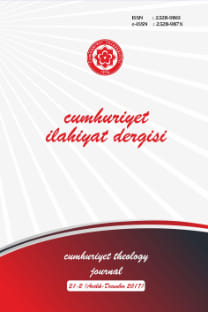Hanefîlerin Cuma Namazını Devlet Başkanı veya İzin Verdiği Kimselerin Kıldırması Şartıyla Kayıtlamasına Usûlî Bir Bakış
Allah Teâla Cuma namazını mutlak ve umûmî olarak emretmiş, Hz. Peygamber de sözlü ve fiili sünneti ile onun kimlere farz olduğunu ve nasıl kı- lınacağını beyan etmiştir. Mezheb imamları Cuma namazının vücubu ve sıhhati konusunda birtakım şartlar ileri sürmüşlerdir. Birinci gruba giren şartlar üzerinde ittifak edilirken ikinci gruptaki şartlar konusunda âlimler arasında ihtilaf bulunmaktadır. Sonucu bakımından, üzerinde ihtilaf edilen şartların en önemlisi Hanefîler tarafından ileri sürülen devlet başkanı şartı- dır. Hanefî mezhebi imamları Cuma namazını devlet başkanı veya izin verdiği kimselerin kıldırması halinde sahih aksi halde sahih olmayacağını; bu durumda onun yerine öğle namazının kılınması gerektiğini söylemişlerdir. Biz bu çalışmada devlet başkanı şartının dayandığı delillerin Hanefî fıkıh usulü açısından Kur’an’ın mutlak ve umumi hükmünü takyid ve tahsis edecek nitelikte olup olmadığını ele alacağız
Anahtar Kelimeler:
Cuma namazı, sıhhat şartı, devlet başkanı, izin, takyid, tahsis
A Methodological Glimpse to Allocation of Friday Prayer with The Condition of Head of State or The Men Who He Allows to Perform it by Hanafit Scholors
Allah the Almighty ordered Friday prayer with an absolute and public statement, The Prophet Muhammed, too, declared it whom is obliged to and how to be performed by his actual and oral tradition. Sectarian Imams suggested a number of conditions for the obligation and authenticity of Friday prayer. While it has been allied on the terms in the first category, there are disputes among scholars about the conditions in the second group. In terms of its result, the most important of the conditions which are disputed, is the condition of the head of state set forth by Hanafits. Hanafi sect Imams said that Friday prayer is accepted as authentic if the head of state performes it or who he would allow to perform, otherwise it will not be authentic, in this case, noon prayers should be performed instead of it. In this study, we will discuss whether the evidences which the condition of the president based on have the qualification to allocate and restrict the absolute and the public decision of Quran in terms of Hanafıt’s usul al-fiqh.
Keywords:
Friday prayer, the authenticity condition, head of state, permission, allocation, restriction,
___
- el-Bedrî es-Sâmerrâî-Mahmud Muhammed Halîl es-Saîdî), Kahire, 1988.
- Ahmed Cevdet, Mecelle, (nşr. Ali Himmet Berki), İstanbul, 1982.
- Ahmed-Muhammed Şakir, el-Bâisü’l-hasîs şerhu muhtasarı Ulumi’l-hadîs, Beyrut, 1983.
- Aʻzamî, Muhammed Mustafa, Studies in Hadith Methodology and Literature, İndiana, 1977.
- Bağdâdî, Ebû Bekr Ahmed b. Ali, el-Kifâye fî ilmi’r-rivâye, Beyrut, 1986.
- Beyhâkî,Ebû Bekr Ahmed b. Hüseyin b. Ali, es-Sünen'ül-Kübrâ, Dâru’l-fikr, ts.
- Buhârî, Ebû Abdillah Muhammed b. İsmail, et-Târîhu’l-kebîr, Beyrut, ts.
- ISSN: 2528-9861
- Yayın Aralığı: Yılda 2 Sayı
- Başlangıç: 1996
- Yayıncı: Cumhuriyet Üniversitesi İlahiyat Fakültesi
Sayıdaki Diğer Makaleler
Ehl-i Sünnet ve İmamiyye Şiasının Ehl-i Beyt Kavramına Yükledikleri Anlamlar
Kur’an’da İnsan Yetiştirme Düzeni Olarak Murâkabe
يذمرتلا ننس يف يمرادلا للع قيقحت دعاجلاسنأ
Ham Ses Düşüncesi ve Arap Dili Ses Çalışmalarına Etkisi
Ğanim Kaddûrî El-Hamed, N. Nihal İnce
Serî es-Sekatî: Hayatı ve Bazı Tasavvufî Görüşleri
Kitap Tanıtımı İzmirli İsmail Hakkı, İlm-i Hılaf
Makûlât-ı Devriyye’de Müstakîmzâde Süleyman Sa‘deddîn’in Mûsikî ve Semâa Dâir Görüşleri
